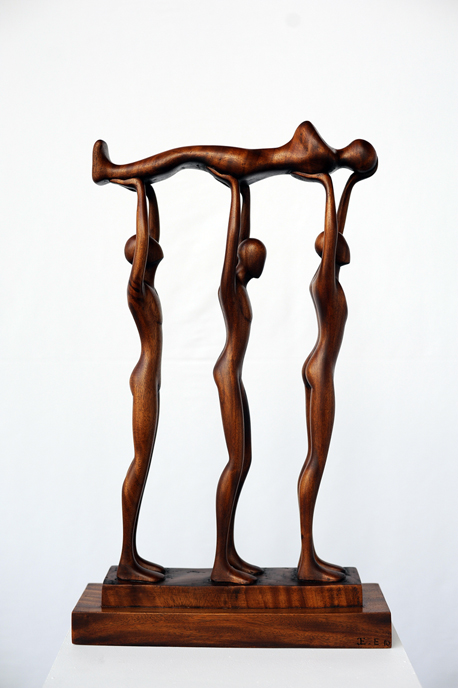But both light and darkness exist. Who would know that better than he would? After all, that was his profession. Darkness needs a place to exist and walls to contain it, or else it will spread. He had chosen the garage initially because he didn’t have a car. But whether the darkness had grown too large, or the amount of empty bottles had left even less room for it, the garage eventually became too small for it. The darkness had escaped from him. It had infiltrated the pine trees at the end of the garden, its fingers mingling with the vine leaves, seeping in through cracks and crevices in the masonry. It gathered behind his back on late winter afternoons when he sat in his office working, slumped over the desk, as if he were carrying the weight of the whole house on his shoulders. This is how I picture him, surrounded by the monstrance of the desk lamp, a lonely back that seemed to suck all the darkness to it.
It wasn’t because I had missed other opportunities in life, or because I had any special affection for cleaning houses. Nor did I hate it. That wasn’t the reason I began to clean other people’s homes. Actually, it wasn’t the cleaning I was interested in when I was vacuuming or swinging around some rag. What most fascinated me were the people whose private spheres I was moving around in. As far back as I can remember I’ve loved to look at houses, to imagine the lives behind the walls and the people who live there. I’ve lost count of the train, car, and bus trips I’ve spent musing over a glimpse of an overgrown garden, the crooked hanging blinds in a first floor apartment, a U-shaped farm among the whispering lindens, patrician villas, modernist complexes, row houses with raised beds and paved driveways, the warm yellow light from an attic window, a man in a kitchen with a fork lifted to his mouth. All these signs and clues; fragments of stories, destinies, lives.
Cleaning other people’s houses was a legitimate way to get into some of the homes I would have no access to otherwise. Just as it requires certain tools to clean—vacuums, buckets, cloths, and such—my body’s ability to handle these tools and the work that could be performed with their help was merely another tool for pursuing what really interested me: gaining insight into other people’s lives. It was kind of like anthropological fieldwork, driven by an obvious yet at the same time half-covert fascination people have always had for studying their fellow species. Also, if the truth be told, it was a lot more enticing than the master’s thesis in anthropology I was supposed to be working on for the past six years. And I got money for doing this, too.
Still, I’d never imagined I was ready to go so far to appease my curiosity. Actually, I hadn’t imagined anything. At least, I’d never thought of him in that way.
It was autumn, late in November, I believe. A quiet, foggy day. I was in the middle of cleaning the bedroom on the first floor. The fog was so dense that it seemed to be pressing against the windows. As if it were too big for outside and wanted in. The three pine trees at the end of the garden were barely discernible, three woolen shadows. I had just finished washing the floor and was about to lay the kilim rug in front of the closet when I heard a sound behind me. I turned my head to see the pastor, standing in the doorway. He had one arm resting on the doorframe and was staring at me. Well, with his face turned toward me—the gaze behind his glasses was more difficult to grasp. He didn’t say anything; he just stood there. I let the rag splash into the bucket and shoved the rug in place with my foot. Why was he standing there like that without saying anything? Why wasn’t he sitting down in his office like he usually was? I grabbed the handle on the bucket and started walking toward the door. His expression said nothing about moving. I continued until I was standing right in front of him—I stood there with the mop in one hand and the bucket in the other. Surely he could see I was on my way out? But he still wasn’t moving; he just stood there in the doorframe and stared at me.




